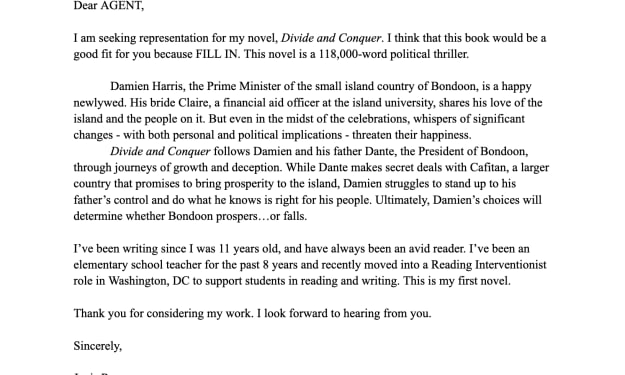Top Five Things...
...I Wish I Knew Before I Wrote A Novel

I'm a writer. I mean, it's probably obvious since I write something on Vocal every week. But I write novels, and it's my dream to be a published author soon. We're working on that.
I started writing when I was 11, and I had no idea what a roller coaster ride it would be. As I'm trying to build my author presence, I've seen a lot of other writers in the same boat as I am, trying to decide between traditional and self-publishing, as well as polishing up manuscripts. So I wanted to share five things that I wish I knew before I wrote my first novel.
1. Planning is not the enemy.
In the writing world, there are two ends of the spectrum when it comes to planning a novel. "Planners" are those who meticulously write out every detail about their characters, world, and plot. These are the writers who know exactly where they are going, have scenes outlined, and know their characters' zodiac signs.
On the other end are "pantsers" - literally, those who write by the seat of their pants. They allow the characters and story to go where they will, going mostly on vibes and hoping for the best.
When I started writing, I was firmly a pantser. I would have a dream inspiration for a specific scene, and then I would write a story to go around it. I generally had no idea where things were going, and this method led me to the graveyard of unfinished manuscripts in my Google drive. As I got older and more experienced, I realized the benefit of finding a middle ground. I could loosely outline the scenes to lead up to a definitive ending, giving myself room to change without floundering about in the stormy sea that is my imagination. When I finally embraced this, I was able to direct my creativity into productivity, quite the opposite of what I was afraid might happen.
2. Dialogue should sound natural.
As a young writer, all of my inspirations were old English heroes living in lofty castles far removed from the common folk. So naturally, when I started writing my own characters, I wrote their dialogue in the same lofty manner. My best friend called me out, reminding me that no one actually talks like that, and no one would want to read through the stuffy, unnatural dialogue that I was writing. So I took a step back, took a breath, and rewrote the dialogue with much success.
I stopped trying to model off of books from a completely different genre from mine and made the characters more approachable, and their conversations more enjoyable to the reader. As a result, even I became more comfortable with reading what I had written.
3. Worldbuilding is hard but necessary.
In my earlier works, describing the setting was one of the last things on my radar. They were in a house, they were in a forest. Nothing made any of the locations unique or interesting, and I rarely described more than was needed for the reader to get where things were happening.
I was also a terrible block describer, throwing paragraphs of descriptions in when I would go back for revisions instead of gradually revealing the world to the reader.
I've gotten so much better at it and even had a beta reader comment on how they could clearly see and understand the world that the book was set in.
In the novel I'm currently writing, I'm making an effort to know the land where things are taking place, down to the smallest detail, and then to sprinkle those details throughout my writing.
4. Revising is a process.
When I finished a novel, I used to immediately jump back into it to start editing and revising. But I've since learned the value of giving it a breath.
I finished the first draft of a novel last weekend, and I still haven't dove into revisions. Instead, I'm working on worldbuilding, mapping out characters, their relationships, and the magic present in the world before I go back in. I've found this to be an important part of the process, forcing me to have a place to look back while I'm revising that has things organized and aligned so that things will be orderly. This is especially important when you consider the leeway that I give myself from the beginning outline to the first draft - I've changed all of the characters' names, importance, and arcs, and I have to reconcile all of that.
When I've finished, I'm going to pull out my Ipad and start the process, marking the draft up and leaving notes to myself before diving into revisions. Then I'll give it a break and start in on the next round.
It's been a test of my patience to revise this way, but I truly do think that it helps me to have a better story in the end. Speaking of patience...
5. Be patient.
Even though becoming more of a planner sped up my writing process, there were days when I would sit down to write and manage maybe a word or two before I was stumped. It was incredibly frustrating, especially considering how much I had improved in writing and the feeling that it should be a walk in the park.
But my incredibly supportive partner reminded me (and still reminds me) that there are so many other factors that impact my writing. I had health issues and money issues and job stresses, all of which made it difficult to focus on myself or my passions at the end of the day. Somedays I did just need to sit around and read or play video games, or even just scroll social media mindlessly.
But sometimes things will just click, and I'll find myself furiously banging out scenes without a sense of how much time has passed.
It's just a reminder to myself, and any other creatives out there, that sometimes you have to wait for the right moment. The right moment for writing, editing, and even publishing.
So there you have it, five things that I've learned in my writing journey. What are some things you wish you knew when you started in your career?
About the Creator
Janis Ross
Janis is a fiction author and teacher trying to navigate the world around her through writing. She is currently working on her latest novel while trying to get her last one published.






Comments
There are no comments for this story
Be the first to respond and start the conversation.